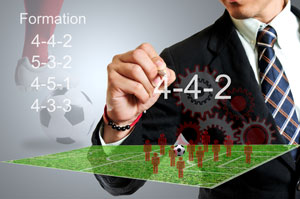Coaching
Soccer through ethics and expertise
In the process of creating a soccer player there are a few mandatory phases such as selection, instruction, training, preparation for competition, and competition.
In addition to technique, tactics and condition in modern soccer increasing attention is being devoted to questions from the fields of educational and socio-psychological work. To create players, generations, plays and competitive results it is essential to dialectically unite the experiences of our trainers, educators, former national team players and scientists of different profiles of culture (doctors of sports medicine, sports training methodologists and others) into one coherent system.
Certain countries dominated in European and in world soccer as long as the basic characteristic of success was giftedness (talent) but their success began to fall rapidly when soccer began to develop as a highly organized sphere of work and professions or, differently said, when soccer training became work, the soccer field a flea market and soccer players a consumer product
Every one of us at birth gets (inherits) a coded model of our development defined enough to bear the seal of the human species but also elastic and specific enough to offer possibilities for unlimited variation. The future young soccer player is a personality whose path of development can be interrupted at any moment. That is why it is essential that those who work with future soccer players, as well as intermediate level soccer players and already affirmed soccer masters are highly educated experts (IBID), people who are far above the average offered by our everyday soccer life. Sadly, we have seen large numbers of trainers, selected most often by people who are not a part of the true spirit of the soccer athlete (economists, political figures and power mongers) who perish in the flame of their unrealistic attempts to achieve personal success, thinking only of themselves and forgetting the soccer players, the tradition and the reputation of the club where they work.
The greatest virtue of sports, including soccer, is humaneness, where one forgets about oneself in the inspiration of the spirit of competitive sports and makes the effort to give as much as possible for others. Giving in order to receive is one of the basic principles of ethics and human qualities. Training success, its rich knowledge and possibilities for application in soccer depend to a large measure on the level of expertise and education of the trainer, his methodological skill and above all his intellectual powers.
The time in which we are preparing the young soccer player or building up the skills of an already affirmed one is always future time. Models in soccer are not and cannot be those from the world of the present, not even if they are the very best. In soccer the models are from the future and the foundations of success rest on experience and creativity from the past. That is why it essential that young, talented experts work with younger generations close to them, where their enthusiasm, strength and talent will overtake the experience of the older ones on their way toward a successful future. The future in soccer has no borders and they must not be drawn by older generations, either, with all due respect for their experience. Experience is acquired while talent is a gift of God and knowledge is their servant .
Click Here to Continue
|

